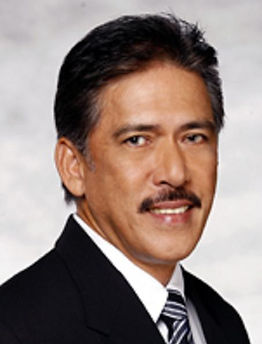
References
http://senate.gov.ph/senators/sen_bio/sotto_bio.asp
http://www.senate.gov.ph/senators/former_senators/vicente_sotto_iii.htm
http://filipinofreethinkers.org/2012/08/17/bloggergate-timeline-of-senator-sottos-plagiarism/
http://pcdspo.gov.ph/pub/201305may-election-almanac.php
http://www.philstar.com/supreme/2012/08/25/841706/how-tito-sotto-tried-ban-eraserheads
http://globalnation.inquirer.net/99861/the-rape-of-pepsi-paloma
Vicente "Tito" Sotto III
United Nationalist Alliance
Born August 24, 1948 in Manila
It was a scandal so comical, it might as well have been an episode of Iskul Bukol.
On August 13, 2012, Senate Majority Leader Vicente “Tito” C. Sotto III delivered his first turno en contra speech versus the then-proposed Reproductive Health bill. His speech made several claims: that the bill promotes abortion, that oral contraceptives causes severe side effects and that his son died at five months old because of his wife’s use of contraceptives.
Two days later, as Sotto delivered his second speech, blogger Alfredo Melgar pointed out that Sotto’s first speech had lifted almost word-for-word a blog post of a certain Sarah Pope of The Healthy Home Economist without credit. Investigative journalist Raissa Robles also reported that his second speech also had word-for-word plagiarisms from at least four sources.
Sotto’s chief of staff Hector Villacorta defended the senator, claiming blog posts aren’t covered by copyright laws. Sotto postponed the closing parts of his turno en contra speech in order to publicly defend himself against critics. The plagiarism scandal had by then been picked up by international news agencies, and several calls for his resignation have been made.
Finally, after several delays, Sotto delivered the final parts of his speech—only for commentators to find out that his closing remarks were direct, unattributed translations of a passage from Robert Kennedy’s Day of Affirmation speech.
Sotto’s only response to yet another plagiarism allegation? “Marunong palang managalog si Kennedy!”
Perhaps this scandal would be most-remembered in Sotto’s 25-year career as a politician, which began in 1988 when he won as vice mayor of Quezon City in 1988.
At that time, Sotto was already a well-established name in show business. He was already a hit-maker with the VST and Co., a co-host on RPN-9’s Eat Bulaga, a TV star, a movie star and a champion bowler and golfer.
An English major graduate from Colegio San Juan de Letran, his career in politics was motivated in no small part by his family’s legacy in the Philippine Senate. His granduncle was Senator Filemon Sotto, who served from 1916-1922, and his grandfather was Senator Vicente Yap Sotto who served from 1946-1953.
His entry to the Philippine Senate in 1992 was met with much fanfare. Campaigning on a platform that promised to stamp out illegal drugs, Sotto overwhelmingly topped the senatorial elections with 11.7 million votes. At a distant second was Ramon Revilla Sr., another actor-turned-politician with an ample 8.3 million votes.
Sotto, a neophyte lawmaker, became the assistant majority leader, held chairmanship of several committees and authored or sponsored a considerable amount of laws. In 1996, he was being groomed as a vice presidential candidate in tandem with then Senator Gloria Macapagal Arroyo, but the pairing fizzled after being refused endorsement by the LDP party.
During his first years as a Senator, Sotto established the Quezon City Ant-Drug Council as part of his war against illegal drugs. Most notably, Sotto even went after popular rock group Eraserheads in 1995 for their song “Alapaap” which Sotto alleged to be about illegal drug use. After the band explained that the senator misconstrued the song’s lyrics (which allegedly was about freedom, not drugs), Sotto rescinded his accusations.
In 1997, the same band would later release the song Spolarium with cryptic lyrics that was very open to interpretation. Many avid listeners took note of a lyrical reference to “Enteng at Joey”, speculating that the song was about the infamous Pepsi Paloma rape case. A fitting revenge, the listeners noted, against the meddling senator Sotto who was also implicated in the case.
The story was that in 1982, 14-year-old Pepsi Paloma (real name Delia Smith) met with Eat Bulaga hosts Vic Sotto, Joey De Leon and Richie Reyes at a bar. Allegedly, the trio drugged her and gang raped her in a hotel room. Pepsi sought help from Defense Secretary Juan Ponce Enrile and Atty. Rene Cayetano, who offered pro bono legal services to the teenager.
As the trio potentially faced death penalty if convicted, Tito Sotto allegedly “coerced” Paloma to signing an Affidavit of Desistance to drop the charges. The coercion, according to Inquirer columnist Rina Jimenez David, involved a pistol being brandished. Paloma later committed suicide in 1985.
Lawyer Rodel Rodis, who had written about the case, notes the irony of Sotto’s alleged involvement considering the senator is championed by the Roman Catholic Church for his staunch “pro-life” stances. Sotto is frequently quoted by church mouthpiece CBCP news, and had featured prominently at their website during the height of the RH bill debates. In consequence, he is also the frequent target of pro-RH groups, especially in online forums and social media. He was even named “Bigot of the Year” by the group Filipino Freethinkers, who also made a P10,000 donation to women’s health advocacy network in his name.
In 2012, Sotto inserted a provision in the proposed Cybercrime Prevention Act which outlaws online libel. The provision was never on Angara’s (the principal sponsor) consolidated bill. Raissa Robles notes that the Sotto was the last to propose amendments on the bill, and he himself moved to close the amendment period.
The move attracted considerable criticism from press freedom advocates as well as online groups, condemning the provision’s take-down clause which would effectively give the government the ability to censor what they deem as “online libel.”
Sotto is seeking a third term as senator for the 2016 elections. He currently dominates the pre-election senatorial surveys of both Pulse Asia and the Social Weather Station.


